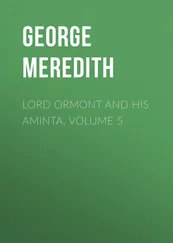George Meredith - Lord Ormont and His Aminta. Complete
Здесь есть возможность читать онлайн «George Meredith - Lord Ormont and His Aminta. Complete» — ознакомительный отрывок электронной книги совершенно бесплатно, а после прочтения отрывка купить полную версию. В некоторых случаях можно слушать аудио, скачать через торрент в формате fb2 и присутствует краткое содержание. Жанр: foreign_prose, literature_19, foreign_antique, на английском языке. Описание произведения, (предисловие) а так же отзывы посетителей доступны на портале библиотеки ЛибКат.
- Название:Lord Ormont and His Aminta. Complete
- Автор:
- Жанр:
- Год:неизвестен
- ISBN:нет данных
- Рейтинг книги:4 / 5. Голосов: 1
-
Избранное:Добавить в избранное
- Отзывы:
-
Ваша оценка:
- 80
- 1
- 2
- 3
- 4
- 5
Lord Ormont and His Aminta. Complete: краткое содержание, описание и аннотация
Предлагаем к чтению аннотацию, описание, краткое содержание или предисловие (зависит от того, что написал сам автор книги «Lord Ormont and His Aminta. Complete»). Если вы не нашли необходимую информацию о книге — напишите в комментариях, мы постараемся отыскать её.
Lord Ormont and His Aminta. Complete — читать онлайн ознакомительный отрывок
Ниже представлен текст книги, разбитый по страницам. Система сохранения места последней прочитанной страницы, позволяет с удобством читать онлайн бесплатно книгу «Lord Ormont and His Aminta. Complete», без необходимости каждый раз заново искать на чём Вы остановились. Поставьте закладку, и сможете в любой момент перейти на страницу, на которой закончили чтение.
Интервал:
Закладка:
His customary enjoyment of dinner convinced Mr. Weyburn that he had not brooded morbidly over his phantom Browny, and could meet Aminta, Countess of Ormont, on the next occasion with the sentiments proper to a common official. Did she not set him a commendable example? He admired her for not concealing her disdain of the aspirant schoolmaster, quite comprehending, by sympathy, why the woman should reproach the girl who had worshipped heroes, if this was a full-grown specimen; and the reply of the shamed girl, that in her ignorance she could not know better. He spared the girl, but he laughed at the woman he commended, laughed at himself.
Aminta’s humour was being stirred about the same time. She and her aunt were at the dinner-table in the absence of my lord. The dinner had passed with the stiff dialogue peculiar to couples under supervision of their inferiors; and, as soon as the room was clear, she had asked her aunt, touching the secretary: “Have you seen him?”
Mrs. Nargett Pagnell’s answer could have been amusing only to one whose intimate knowledge of her found it characteristically salt; for she was a lady of speech addressed ever directly or roundabout to the chief point of business between herself and her hearer, and the more she was brief, oblique, far-shooting, the more comically intelligible she was to her niece. She bent her head to signify that she had seen the secretary, and struck the table with both hands, exclaiming:
“Well, to be sure, Lord Ormont!”
Their discussion, before they descended the stairs to dinner, concerned his lordship’s extraordinary indifference to the thronging of handsome young men around his young countess.
Here, the implication ran, is one established in the house.
Aminta’s thoughts could be phrased: “Yes, that is true, for one part of it.”
As for the other part, the ascent of a Phoebus Apollo, with his golden bow and quiver off the fairest of Eastern horizon skies, followed suddenly by the sight of him toppling over in Mr. Cuper’s long-skirted brown coat, with spectacles and cane, is an image that hardly exceeds the degradation she conceived. It was past ludicrous; yet admitted of no woefulness, nothing soothingly pathetic. It smothered and barked at the dreams of her blooming spring of life, to which her mind had latterly been turning back, for an escape from sour, one may say cynical, reflections, the present issue of a beautiful young woman’s first savour of battle with the world.
CHAPTER VI. IN A MOOD OF LANGUOR
Up in Aminta’s amber dressing-room; Mrs. Nargett Pagnell alluded sadly to the long month of separation, and begged her niece to let her have in plain words an exact statement of the present situation; adding, “Items will do.” Thereupon she slipped into prattle and held the field.
She was the known, worthy, good, intolerable woman whom the burgess turns out for his world in regiments, that do and look and all but step alike; and they mean well, and have conventional worships and material aspirations, and very peculiar occult refinements, with a blind head and a haphazard gleam of acuteness, impressive to acquaintances, convincing themselves that they impersonate sagacity. She had said this, done that; and it was, by proof, Providence consenting, the right thing. A niece, written down in her girlhood, because of her eyes and her striking air and excellent deportment, as mate for a nobleman, marries, him before she is out of her teens. “I said, She shall be a countess.” A countess she is. Providence does not comply with our predictions in order to stultify us. Admitting the position of affairs for the moment as extraordinary, we are bound by what has happened to expect they will be conformable in the end. Temporarily warped, we should say of them.
She could point to the reason: it was Lord Ormont’s blunt misunderstanding of her character. The burgess’s daughter was refining to an appreciation of the exquisite so rapidly that she could criticize patricians. My lord had never forgiven her for correcting him in his pronunciation of her name by marriage. Singular indeed; but men, even great men, men of title, are so, some of them, whom you could least suspect of their being so. He would speak the “g” in Nargett, and he, declined—after a remonstrance he declined—to pass Pagnell under the cedilla. Lord Ormont spoke the name like a man hating it, or an English rustic: “Nargett Pagnell,” instead, of the soft and elegant “Naryett Pagnell,” the only true way of speaking it; and she had always taken that pronunciation of her name for a test of people’s breeding. The expression of his lordship’s countenance under correction was memorable. Naturally, in those honeymoony days, the young Countess of Ormont sided with her husband the earl; she declared that her aunt had never dreamed of the cedilla before the expedition to Spain. When, for example, Alfred Nargett Pagnell had a laughing remark, which Aminta in her childhood must have heard: “We rhyme with spaniel!”
That was the secret of Lord Ormont’s prepossession against Aminta’s aunt; and who can tell? perhaps of much of his behaviour to the beautiful young wife he at least admired, sincerely admired, though he caused her to hang her head—cast a cloud on the head so dear to him!
Otherwise there was no interpreting his lordship. To think of herself as personally disliked by a nobleman stupefied Mrs. Pagnell, from her just expectation of reciprocal dealings in high society; for she confessed herself a fly to a title. Where is the shame, if titles are created to attract? Elsewhere than in that upper circle, we may anticipate hard bargains; the widow of a solicitor had not to learn it. But when a distinguished member and ornament of the chosen seats above blew cold upon their gesticulatory devotee, and was besides ungrateful; she was more than commonly assured of his being, as she called him, “a sphinx.” His behaviour to his legally wedded wife confirmed the charge.
She checked her flow to resume the question. “So, then, where are we now? He allows you liberally for pin-money in addition to your own small independent income. Satisfaction with that would warrant him to suppose his whole duty done by you.”
“We are where we were, aunty; the month has made no change,” said Aminta in languor.
“And you as patient as ever?”
“I am supposed to have everything a woman can require.”
“Can he possibly think it? And I have to warn you, child, that lawyers are not so absolving as the world is with some of the ladies Lord Ormont allows you to call your friends. I have been hearing—it is not mere airy tales one hears from lawyers about cases in Courts of Law. Tighten your lips as you like; I say nothing to condemn or reflect on Mrs. Lawrence Finchley. I have had my eyes a little opened, that is all. Oh, I know my niece Aminta, when it’s a friend to stand by; but our position—thanks to your inscrutable lord and master—demands of us the utmost scrupulousness, or it soon becomes a whirl and scandal flying about, and those lawyers picking up and putting together. I have had a difficulty to persuade them!… and my own niece! whom I saw married at the British Embassy in Madrid, as I take good care to tell everybody; for it was my doing; I am the responsible person! and by an English Protestant clergyman, to all appearance able to walk erect in and out of any of these excellent new Life Assurance offices they are starting for the benefit of widows and orphans, and deceased within six days of the ceremony—if ceremony one may call the hasty affair in those foreign places. My dear, the instant I heard it I had a presentiment, ‘All has gone well up to now.’ I remember murmuring the words. Then your letter, received in that smelly Barcelona: Lord Ormont was carrying you off to Granada—a dream of my infancy! It may not have been his manoeuvre, but it was the beginning of his manoeuvres.”
Читать дальшеИнтервал:
Закладка:
Похожие книги на «Lord Ormont and His Aminta. Complete»
Представляем Вашему вниманию похожие книги на «Lord Ormont and His Aminta. Complete» списком для выбора. Мы отобрали схожую по названию и смыслу литературу в надежде предоставить читателям больше вариантов отыскать новые, интересные, ещё непрочитанные произведения.
Обсуждение, отзывы о книге «Lord Ormont and His Aminta. Complete» и просто собственные мнения читателей. Оставьте ваши комментарии, напишите, что Вы думаете о произведении, его смысле или главных героях. Укажите что конкретно понравилось, а что нет, и почему Вы так считаете.












